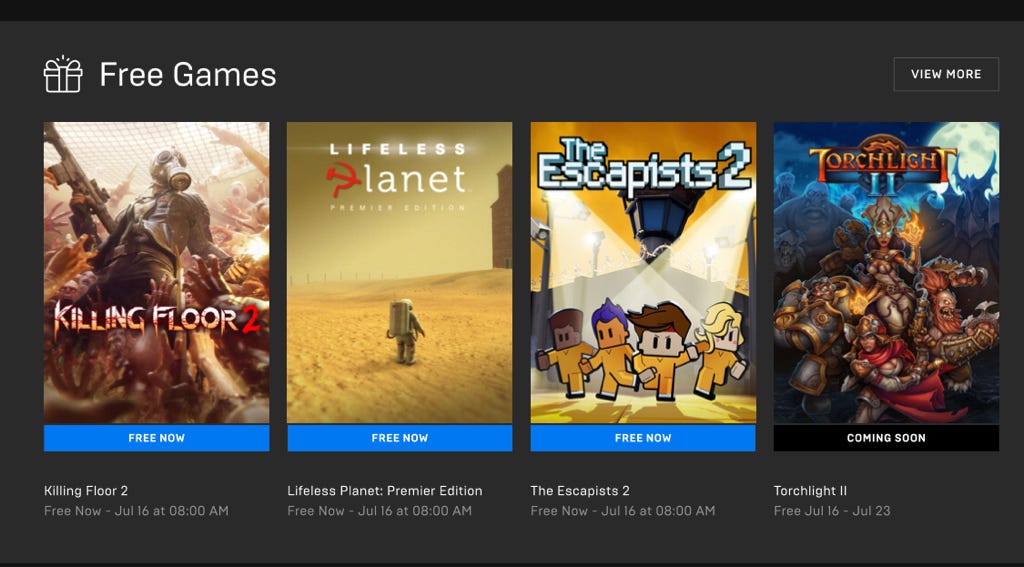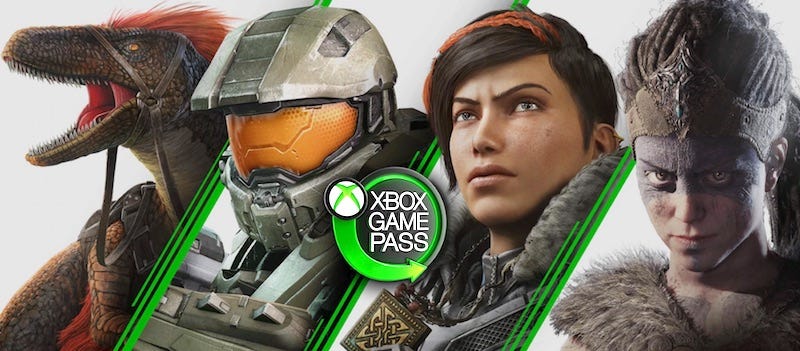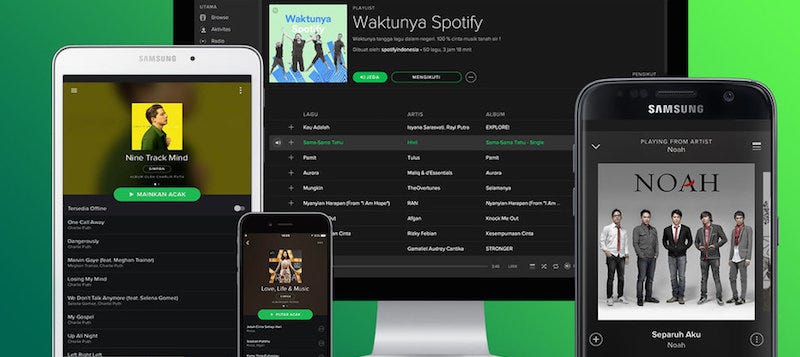Trending
Opinion: How will Project 2025 impact game developers?
The Heritage Foundation's manifesto for the possible next administration could do great harm to many, including large portions of the game development community.

Featured Blog | This community-written post highlights the best of what the game industry has to offer. Read more like it on the Game Developer Blogs or learn how to Submit Your Own Blog Post
All about 'free games' and backlogs, and the stealth rise of the subscription games service. And how perhaps the one you’re not paying attention to is the one that’s going to sneak up behind you?

Hi, I’m ‘how people find your game’ expert Simon Carless, and you’re reading the Game Discoverability Now! newsletter, which you can subscribe to now, a regular look at how people discover and buy video games in the 2020s.]

This newsletter started because of something I posted off the cuff on Twitter a few weeks ago, related to the Epic Games Store and free game giveaways.
But things evolved, and this article is now about both a) ‘free games’ and backlogs, and b) the stealth rise of the subscription games service. And how perhaps the one you’re not paying attention to is the one that’s going to sneak up behind you?
But it all started here:
Kinda feel like Epic is giving away too many games nowadays, leaving people with big libraries of unplayed games (which might make them slightly less likely to buy new ones?) https://t.co/k0DYqsKWtv
— Simon Carless (@simoncarless) July 9, 2020
My comment was based on the Epic Games Store image at the top of this article. (Three excellent, completely free games, available for 7 days just by logging onto EGS and redeeming.)
In Epic’s defense, having looked at a historical list of free Epic Games Store games, it turns out this ‘3 free games in one week’ is a bit of an anomaly. The Escapists 2 got delayed for technical reasons. (It’s more often two per week - you can see upcoming ones on the EGS ‘free games’ page now.)
Epic’s reason for these giveaways is clear. It’s relatively inexpensive for them, gives devs some extra ‘bonus’ money during their long tail, and increases the amount of people potentially using their platform. (Twitch also does this.)
But, the open question is - are giveaways (and subscription services, more on those later!) creating an environment where video games are being devalued?
Naturally, I got a number of replies to this Tweet. Firstly, there’s the opinion exemplified by Mike Kasprzak (Ludum Dare creator), that these things are absolutely making a difference to his spending:
Yup. Epic, Twitch/Amazon Prime + Sony + Microsoft (with subscription), occasional freebies from Humble, etc. I'm spending dramatically more money on hardware and mods than I am on games these days. 😅
— Mike Kasprzak 🦖 (@mikekasprzak) July 9, 2020
Secondly, there’s Dylan Holmes’ point of view, which is essentially ‘keep calm and enjoy your backlog’. We impulse download games (or buy them in sales!) a lot, and Epic’s tactics are really nothing new, or much of an escalation:
I think the issue is that most PC gamers who are "value gamers" and don't just impulse-buy, or buy to be part of the conversation, were already in this position long before Epic came along.
— Dylan Holmes (@Aerothorn) July 9, 2020
I literally own 666 (not a joke) games I want to play and have never started.
Thirdly, Mod.io founder Scott Reismanis has a view combining the two, which is basically that ‘massive Steam/Epic backlogs are fine and non-dangerous, but subscriptions might be another story’.
I thought this years ago when bundling began but it never really happened. People will always want new games, and back catalogs will continue to grow to be played occasionally. Subscription services will have a bigger impact in my opinion and games will find new ways to monetize
— Scott Reismanis (@scottreismanis) July 10, 2020
I think I’m with Scott too, after thinking about it for a while. ‘A few free games on X platform’ are not - in themselves - going to make me stop buying new games. Especially if they are slightly older titles, and not in the genre/subgenre that I most adore.
But I do wonder about the rise of the ‘play brand new games on launch for a monthly fee’ subscription service. And right now, nobody is doing subscription service better than Microsoft with Xbox/PC Game Pass and xCloud - partly because Sony and Nintendo are choosing not to seriously* play in the space.
(*Yes, I know PlayStation Now exists. But it’s not a major part of Sony’s next-gen strategy.)

Look, platforms as services are a really big thing right now. Hardware is becoming less well differentiated, and so lots of the world’s biggest companies are finding ways to get people to pay monthly for content across multiple devices. (Not just in video games!)
So, now we have Xbox Game Pass, which had 235 games (!) available as of last weekend. With Microsoft’s new third-party studio acquisition strategy, and debuting all of its first-party games on Game Pass, they’re building a formidable line-up.
Polygon EIC Chris Plante’s brand new (excellent!) ‘week in review’ newsletter, Postgame discusses this in some detail this week. Here’s one part I wanted to extract and expand upon:
“I still have lots of questions about the financials — we don’t necessarily want Game Pass to do to game creators what iTunes and Spotify did to the music industry. And I worry about publicly available sales metrics… But having spoken with a number of indie and studio developers about their opinions of Game Pass, I’m cautiously optimistic.”
We see iTunes/Spotify mentioned quite a bit as a ‘worst case scenario’, and for good reason: $0.0032 per song played is a scary situation, and there’s definitely been significant value destruction for conventional artists in the music biz.

But thus far, there’s quite a few things stopping Xbox Game Pass (or other subscription services) from caving in revenue in a similar way to Spotify.
Firstly, third-party Game Pass deals are for a limited time (one year, generally) so you’re not permanently in the catalog. Secondly, Xbox is probably 25% or less of total expected revenue for a multi-platform game release. So a Game Pass deal can be seen as ‘replacement revenue’ for the copies you would have sold on that system. Or just ‘free revenue’!
(I believe the pitch is that your overall sales won’t decrease. Right now, Game Pass definitely doesn’t seem to affect Steam sales. And it’s also true that the increased Game Pass visibility can really help games, such as with my No More Robots compadres and Descenders.)
So it’s not like Spotify, which gobbled market share with a completely different model, one that paid fractions of a cent on the dollar. The guaranteed $ of being in Game Pass is just shifting the mix, currently.

So what’s Game Pass like? Rather than Spotify, I would compare Xbox Game Pass much more to what Amazon has been doing with Amazon Prime Video.
On the one hand, some of the Xbox Game Pass titles from Xbox-owned studios are costing many, many millions of dollars and are wholly owned by Microsoft (think - The Man In The High Castle for Amazon Prime Video.)
On the other hand, many smaller/indie Game Pass titles are getting much less $ than that, but can sell on all other platforms and get a massive distribution/player boost at the same time. (On the Amazon Prime Video side of things, think It Started As A Joke, the new Eugene Mirman Comedy Festival doc.)
This seems a little less scary - a little bit more of a gradual change, with graded payouts for different types of games, right?
Here’s the thing. Game Pass is very good. I really like it - and almost everyone I know really likes it. It lets you try out a range of games that you wouldn’t otherwise try, it has excellent quality titles, and it celebrates creativity. Putting all Microsoft first-party games day one on Game Pass is aggressive, but fair enough.
But. Game Pass doesn’t provide enough money on its own - unless Microsoft owns your studio - for game creators to make their game from scratch. It’s inherently somewhat exclusionary, because there are only a limited amount of available Game Pass slots for developers. And it’s training people not to pay standalone for games.
This isn’t a problem now. It probably isn’t a problem in 12-24 months. And the short-term upside from being on Game Pass is great. Yet I wonder.
How many copies of that indie Eugene Mirman documentary have been sold or rented outside of Amazon Prime Video? (I’m guessing almost none.) What percentage of the post-launch revenue for that doc came from Amazon Prime Video? (I’m guessing almost 100%.)
Are we sleepwalking into this situation for the game biz, 5-10 years down the road, when these type of services rule the waves for premium (non-F2P) games, and platform relationships will dictate success?
I really don’t know. And even if it starts heading that way, platforms can say ‘well, nobody would have seen that documentary if it wasn’t on the service, we got all these people to watch it!’ (Or the ‘translated to games’ version of that!)
That’s quite possibly true. But in that direction lies the chilling land of increased market share, platform power, and potentially even platform monopoly. And platform monopolies are NOT my favorite thing, folks.
You May Also Like